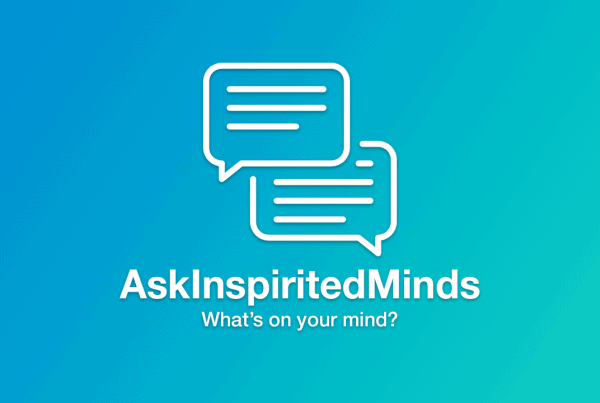Question
Does Islam talk about Mental Health?
~
Response
As-Salaamun ‘Alaikum – peace be with you,
Thank you for reaching out to us, we know that it isn’t easy and we appreciate the confidence you have placed in us. May you be rewarded, Ameen.
We are pleased that you have asked us this question as it puts everything we do here at Inspirited Minds into context! The short answer to your question is YES.
It seems that we are living with a common misconception that assumes psychology is just a western philosophy and that Islam does not seem to directly address it. Whilst the latter may in some sense be true, there is no reason that we cannot apply our knowledge of Islam to everyday matters. We need to remember that Islam is not just a ‘religion’ as we often constrict it to, it is ‘a way of life’, suggesting that it encompasses all aspects of our lives, including our mental health.
From an academic context, mental health is commonly referred to within the subject area of psychology and psychiatry. The field of ‘Islamic psychology’ is the study of the ‘nafs’ (the soul), which also has been translated into the ‘self/ psyche/ mind’ from an Islamic perspective. This Islamic concept also takes into account all the subject areas that you would find in the textbook version of psychology such as neuroscience, philosophy and psychiatry, displaying how Islam can practically play a part in the learning of mental health. More about this can be found here, from The British Psychological Society.
However, from a spiritual context, there are many areas of Islam that touch upon the topic of mental health. For example, Allah (SWT) says in the Qur’an
“And We will surely test you with something of fear and hunger and a loss of wealth…but give good tidings to the patient” [Qur’an 2:155].
Notice how Allah (SWT) mentions the first test as being ‘fear’. This can be interpreted within the concept of mental health, as often when people realise that something is wrong in their lives, they become unsure of themselves or what to do next in the situation. This lack of clarity can often lead to the natural state of fear. However, it can also be interpreted as Allah (SWT) testing us directly through fear, which is a common symptom of anxiety. That is not to say that every time we feel fear, it means that we have been diagnosed with anxiety, rather Allah (SWT) comforts us by mentioning in later verses that displaying that fear is one of the many tests that we can overcome by bearing patience.
From the Prophet’s (ﷺ) life, we can also learn about how he navigated his mental health despite facing many intense trials. A key theme that ran throughout his life was sadness and grief. Right from the start of his life, the Prophet’s (ﷺ) father passed away when he was born. His mother passed away when he was 6 years old and his most beloved wife and uncle passed away when he needed them the most. People were also rejecting the message of Islam calling him a madman. The Prophet (ﷺ) reached such a low point that a whole year in his life was named as ‘the year of sorrow’. This extreme sense of sadness and pain is what we now often refer to as depression. His life does not only reflect how it is normal for a human being to go through such trials, but also demonstrates practical ways on how to deal with such events – the main way being to never give up hope in Allah (SWT).
Iman (faith) is comprised of two halves; half is sabr (patience) and half is shukr (thankfulness), [Ibn Qayyim Al-Jawziyyah]. Islam teaches us that we should be in these two states in both the good and the bad times as it leads the heart feeling ridaa (contentment). This forms one of the many concepts in Islam that enable us to develop a positive mindset – a goal of many therapy and counselling sessions.
There is also much scientific evidence in scholarly journals on how reading/ listening to the Holy Qur’an can help ease the mind and has even shown to be effective in reducing symptoms associated with depression.
“Verily, in the remembrance of Allah do hearts find rest.” [Qur’an 13:28].
As mentioned above, Islam has provided us with many examples where mental health is addressed and most importantly, the medicine that allows us to maintain a healthy state of mind in all situations. For this, we say Alhamdulillah (All praise is to Allah).
These are just some humble suggestions. We sincerely hope and pray that one or more of them will be suitable to your circumstances and help create ease for you, In shaa Allah (if Allah wills). If you would like to discuss anything else on your mind, we also offer more personalized counselling here at Inspirited Minds.
Please don’t hesitate to contact us if you need any further support.
Allah knows best and we hope this helps In Shaa Allah (if Allah wills),
Du’as (supplication) always,
IM Support Team
~
Ask Inspirited Minds is a safe, anonymous and confidential space for you to ask specific questions or seek advice around your mental health and wellbeing. We will publish your question and our response on our website but will make sure to make it anonymous and change any identifiable details. If you are going through these problems, then it’s highly likely someone else is going through something similar and we hope our advice can also be of help to others in a similar situation.
Click the link below to send us your question


